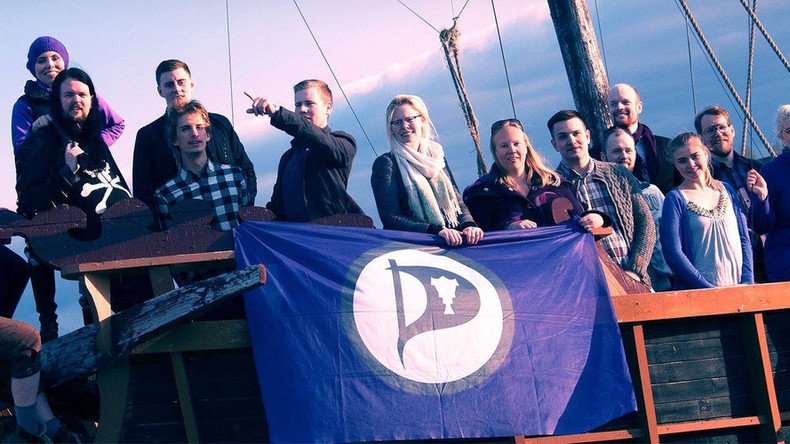Iceland’s Pirate Party poised for Saturday election win – poll

Iceland’s national election is likely to bring unprecedented results, with a new poll suggesting the Pirate Party will win. Led by a poet and former WikiLeaks activist, it’s running on an anti-corruption campaign against the financial and political elite.
An opinion poll conducted by the Social Science Research Institute of the University of Iceland and commissioned by Morgunblaðið newspaper found that one in five voters intends to cast their ballot for the Pirate Party on Saturday.
That figure puts the party in first place with 22.6 percent of the votes – 1.5 percent ahead of the center-right Independence Party, which is currently in power. Those numbers would give each of the two parties 15 MPs in the 63-seat parliament.
Such a win would be history-making for the Pirate Party, which is led by Birgitta Jónsdóttir – a poet, web developer, former WikiLeaks activist.
The party's forecast success is largely based on its campaign against perceived corruption among Iceland's elite.
Support for the party increased by a whopping 43 percent after the resignation of Prime Minister Sigmundur David Gunnlaugsson in April, after it was revealed that he and his family had sheltered money in offshore accounts. The party's cause was also helped by the Panama Papers, which revealed other prominent Icelandic politicians had done the same.
Earlier this year, Jónsdóttir called her party's success “strange and very exciting,” adding that it was “driven not by fear, but by courage and hope,” the Guardian reported.
However, she has acknowledged that the party – which was created less than four years ago as a movement against global copyright laws – is inexperienced when it comes to the economy.

“We know that we are new to this and it is important that we are extra careful and extra critical on ourselves to not take too much on. I really don't think that we are going to make a lot of ripples in the economy in the first term,” she told Reuters last month.
However, the Pirate Party – whose campaign is largely crowdfunded – is after more than just looser copyright laws and less corruption from politicians. In an effort to get young voters on board, the party has asked the developers of the popular app Pokemon Go to turn polling stations into Pokestops – locations where players can collect the items necessary to catch Pokemon.
The party has also promised to grant asylum to US whistleblower Edward Snowden and accept the bitcoin currency. It has also pledged to give voters a direct say over policy and decriminalize drugs.
The Pirate Party last week ruled out the possibility of entering a coalition with the Independence Party (Sjálfstæðisflokkurinn) or the centrist Progressive Party (Framsóknarflokkurinn). Jónsdóttir has suggested she would prefer to be the speaker of the Icelandic parliament, rather than becoming prime minister.
The party's predicted success will be a huge leap from the 2013 general election, when it gained just 5 percent of votes and three seats in parliament. That result was still extremely significant, however, as it made Iceland the only country in the world have members of the Pirate movement in government.
The Pirate Party first began in Sweden in 2006, and was created to bring about digital copyright reform. There are now 40 such parties around the world.














